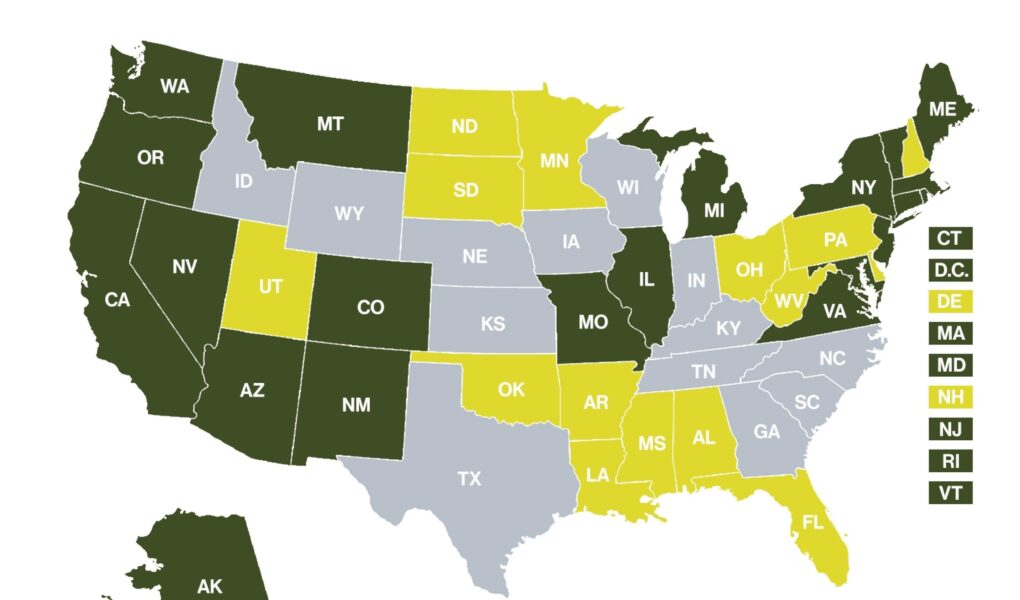In recent years, the debate surrounding marijuana legalization has ignited passionate discussions across the globe, transcending age, background, and political affiliation. As societal perceptions evolve, the question arises: why should marijuana be legal? This inquiry is not solely about recreational use or the allure of the green plant; it encompasses a complex web of social justice, economic opportunity, public health, and personal freedom. In this article, we delve into the myriad reasons that support the push for legalization, examining the potential benefits that range from reducing crime rates to fostering medical advancements. By shedding light on the multifaceted arguments for legalization, we aim to provide a balanced perspective that goes beyond stigma and rhetoric, inviting readers to consider the implications for individuals and society as a whole. Join us as we explore the compelling case for marijuana’s lawful embrace in today’s world.
Table of Contents
- The Economic Benefits of Legalizing Marijuana
- Public Health and Safety Considerations in Cannabis Legalization
- Social Justice and Equity in Marijuana Policy Reform
- Innovative Regulatory Models for a Successful Cannabis Market
- Q&A
- Future Outlook
The Economic Benefits of Legalizing Marijuana
Legalizing marijuana can lead to a significant boost in economic growth through various channels. The tax revenue generated from the sale of marijuana has the potential to fund critical public services. States that have legalized cannabis have witnessed substantial increases in tax collections. This additional revenue can be allocated to education, healthcare, and infrastructure development, thereby enhancing the overall wellbeing of the community. A report by the Marijuana Policy Project indicated that states like Colorado have generated millions annually, showcasing the financial viability of such legislation.
Moreover, the legalization of marijuana creates numerous job opportunities across multiple sectors. From cultivation and distribution to retail and ancillary services, the cannabis industry demands a diverse workforce. This not only brings direct employment but also stimulates related industries, such as agriculture, transportation, and security. A report from New Frontier Data projects that by 2025, legal cannabis could create over 1 million jobs in the U.S. alone, significantly contributing to the economy and providing a pathway to upward mobility for many individuals.
Public Health and Safety Considerations in Cannabis Legalization
The legalization of cannabis presents a unique opportunity to address various public health and safety issues that have long been connected to its prohibition. By regulating its use, governments can implement standardized quality controls, significantly decreasing the risks associated with contaminated or potent products. This not only protects consumers but also facilitates the establishment of controlled dispensaries where professionals can educate users on responsible consumption. Furthermore, the potential for harm reduction practices can be explored through the promotion of safer use methods, which can ultimately lead to better health outcomes for users.
Another critical consideration is the impact on law enforcement and public safety. By shifting focus from criminalization to regulation, law enforcement agencies can allocate resources toward more pressing issues, such as violent crime and public safety interventions. Statistical models suggest the following benefits of legalization:
| Aspect | Outcome |
|---|---|
| Arrests for Cannabis Possession | Reduction in arrests by up to 70% |
| Traffic Incidents | Improved safety regulations may lower incidents |
| Public Health Savings | Potential savings in healthcare costs through treatment and prevention |
These findings highlight the potential for the legal cannabis market to foster healthier communities and safer environments. By creating an informed framework for marijuana use, society can reap the benefits of legalization while minimizing risks associated with its consumption.
Social Justice and Equity in Marijuana Policy Reform
The legalization of marijuana presents a unique opportunity to address the systemic injustices that have historically plagued communities, particularly those of color. The disparities in arrest rates for marijuana-related offenses reveal a stark reality—while usage rates are similar across different demographics, Black and Latino individuals are disproportionately targeted by law enforcement. This has led to devastating consequences for these communities, including high incarceration rates, fractured families, and barriers to employment. By reforming marijuana policy, we can begin to dismantle these inequities and create pathways for economic empowerment and social healing.
Furthermore, responsible cannabis legalization can pave the way for holistic approaches to equity. This includes measures such as allocating tax revenues from legal marijuana sales toward community programs, expunging criminal records for those previously convicted of non-violent cannabis offenses, and prioritizing licenses for minority-owned businesses in the cannabis industry. Effective reform should also emphasize education and workforce development to ensure that the benefits of legalization are shared broadly. Potential strategies include:
- Establishing mentorship programs for aspiring minority entrepreneurs.
- Implementing revenue-sharing models that fund community health initiatives.
- Creating accessible training programs in cannabis cultivation and retail management.
To illustrate the scope of disparities and the potential impact of reform, the following table summarizes relevant statistics:
| Statistic | White Individuals | Black Individuals | Latino Individuals |
|---|---|---|---|
| Marijuana Usage Rate | 9.5% | 9.8% | 10.2% |
| Arrest Rate for Possession | 1 in 1000 | 1 in 250 | 1 in 500 |
| Incarceration Rate for Non-Violent Offenses | 0.5% | 3.5% | 2.0% |
These figures highlight the urgent need for deliberate policy changes that prioritize social justice, thus ensuring that the benefits of legalization reach those who have been historically marginalized. By advocating for equitable policies, we can redefine the narrative surrounding marijuana, transforming it into a vehicle for social justice rather than a source of division.
Innovative Regulatory Models for a Successful Cannabis Market
The cannabis market stands on the precipice of transformation, driven by the urgent need for innovative regulatory frameworks that prioritize public health and safety while fostering economic growth. Regulatory models designed with flexibility and adaptability can address the unique challenges posed by cannabis legalization. By launching pilot programs in select jurisdictions, authorities can gather data and insights to refine regulations iteratively. This approach can facilitate a collaborative environment where stakeholders, including consumers, small businesses, and public health officials, can contribute to shaping policies that effectively mitigate risks while promoting responsible consumption.
To enhance the efficacy of the regulatory landscape, several key elements should be considered:
- Consumer Education: Robust education campaigns informing the public about responsible usage and potential health risks.
- Quality Control Measures: Standardized testing protocols to ensure product safety and consistency.
- Market Access for Small Producers: Policies that empower local growers and producers, fostering a diverse marketplace.
- Tax Incentives: Fiscal strategies to incentivize compliance and reinvestment into communities.
- Community Participation: Involvement of local stakeholders in decision-making processes to build trust and transparency.
Q&A
Q&A: Why Marijuana Should Be Legal
Q: What are the primary arguments for legalizing marijuana?
A: Advocates argue that legalizing marijuana can lead to a multitude of benefits. These include increased tax revenue for governments, reduced costs associated with enforcement of prohibition, improved public health through regulated products, and the potential for marijuana to provide relief for various medical conditions.
Q: How does legalization impact law enforcement?
A: Legalization can significantly reduce the burden on law enforcement agencies. By decriminalizing possession and use of marijuana, police can focus on more serious crimes rather than low-level drug offenses. This not only helps to raise community trust but also reduces the number of individuals entering the criminal justice system for minor infractions.
Q: What can we learn from states that have already legalized marijuana?
A: States like Colorado and California have provided real-world data on marijuana legalization. They’ve seen economic growth through the creation of new jobs in the cannabis industry, alongside increased tax revenue that can be directed toward education and public health initiatives. Additionally, these states report a decrease in marijuana-related arrests, highlighting a more equitable legal approach.
Q: Are there health benefits associated with marijuana that support its legalization?
A: Yes, research indicates that marijuana can provide relief for numerous medical conditions, including chronic pain, anxiety, and epilepsy. Legalizing marijuana allows patients access to a regulated and safe product, reducing the risks associated with black-market alternatives. Furthermore, it opens avenues for further research into its potential therapeutic applications.
Q: How might legalization affect youth usage rates?
A: Some fear that legalizing marijuana will lead to increased use among youth; however, studies from legalized states show mixed outcomes. Regulation means better control over sales and marketing practices, which can limit access for minors. Education and responsible use campaigns can also promote safer choices among young people.
Q: What are the economic benefits of legalization?
A: The economic argument for legalization is compelling. Taxing legal marijuana sales can generate substantial revenue for state governments, which can then be used for public services. Additionally, the industry creates jobs in agriculture, retail, and marketing. It can invigorate local economies, especially in areas that may suffer from unemployment.
Q: How does marijuana legalization tie into social justice issues?
A: Legalization offers an opportunity to address the inequalities created by past drug prohibition policies. Communities disproportionately impacted by criminalization can benefit from expungement of records and investment in local resources. It promotes a fairer system, recognizing the injustices faced by individuals arrested for marijuana offenses.
Q: What about the potential risks associated with legalization?
A: While there are concerns regarding increased use and health risks, these issues can be mitigated through regulation and public awareness. Legalization does not equate to blanket acceptance. Instead, it allows for a controlled approach, ensuring that consumers are informed and that use is monitored.
Q: How can the risks of legalization be effectively managed?
A: A well-structured regulatory framework is crucial. This includes age restrictions, quality control, labeling standards, and public health campaigns. Education around responsible use, similar to alcohol or tobacco campaigns, can further assist in minimizing potential negative outcomes.
Q: What is the future of marijuana legalization in the United States?
A: The trend seems to be moving toward greater acceptance and legalization across many states. Public opinion is increasingly in favor of legalizing marijuana, driven by its benefits and changing attitudes toward drug use. As more states regulate marijuana, a clearer picture of its societal effects will emerge, paving the way for potential federal reform.
Future Outlook
As we draw the curtains on this comprehensive exploration of marijuana legalization, it becomes evident that the conversation surrounding this multifaceted issue is not just about the substance itself, but about the values we uphold as a society. The arguments presented—ranging from economic benefits and medical advancements to social justice and individual freedoms—paint a picture of a landscape ripe for change.
While challenges and concerns will undoubtedly accompany any shift in policy, the potential benefits of legalization offer a compelling case for thoughtful consideration. As we navigate this evolving narrative, it is essential to foster a dialogue that transcends stigma and embraces a holistic understanding of marijuana’s place in our lives and communities.
In the coming years, as more jurisdictions reconsider their stance on cannabis, let us approach this issue with an open mind and a willingness to learn. The future of marijuana legalization may very well redefine our laws, health standards, and even our cultural perceptions. Only time will tell how this chapter unfolds, but one thing is certain: the discussion is far from over.



